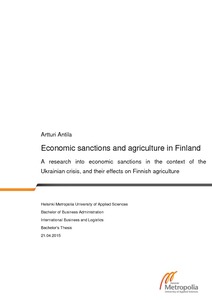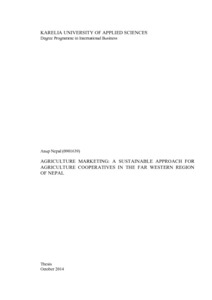Organic Farming, Sustainable Agriculture, and Technical Innovations in Finland
Tamang, Sunita (2024)
Tamang, Sunita
2024
All rights reserved. This publication is copyrighted. You may download, display and print it for Your own personal use. Commercial use is prohibited.
Julkaisun pysyvä osoite on
https://urn.fi/URN:NBN:fi:amk-2024112429705
https://urn.fi/URN:NBN:fi:amk-2024112429705
Tiivistelmä
This thesis considers modern technologies and their effects on the organic farming sector within the Finnish context in terms of sustainability, productivity and profit. Combining email interviews with agricultural stakeholders such as MTK, ProAgria, and Luomuinstituutti and an elomake survey conducted among farmers and industry representatives the research investigates the level of penetration of technologies such as precision agriculture, IoT systems, renewable energy solutions, and biological pest management systems.
The results indicate that while technology has the potential to enhance economic efficiency and promote green practices, there are high costs for organic farming technologies, lack of technical expertise and technology standardization issues which remain perennial barriers. Organizational support for organic farmers provided by MTK and ProAgria is important for overcoming these barriers through capacity building, consulting, and finance.
The thesis emphasized the policy framework and concerted efforts from various stakeholders directed at strengthening organic innovation. It ends with suggestions for increasing the use of technology by farmers, for instance, through more adequate funding, education, and technology production geared toward the needs of farmers. This research provides important information in the field of sustainable development agriculture as well as outlines the landmarks of future changes in the Finnish organic farming.
The results indicate that while technology has the potential to enhance economic efficiency and promote green practices, there are high costs for organic farming technologies, lack of technical expertise and technology standardization issues which remain perennial barriers. Organizational support for organic farmers provided by MTK and ProAgria is important for overcoming these barriers through capacity building, consulting, and finance.
The thesis emphasized the policy framework and concerted efforts from various stakeholders directed at strengthening organic innovation. It ends with suggestions for increasing the use of technology by farmers, for instance, through more adequate funding, education, and technology production geared toward the needs of farmers. This research provides important information in the field of sustainable development agriculture as well as outlines the landmarks of future changes in the Finnish organic farming.
Kokoelmat
Samankaltainen aineisto
Näytetään aineisto, joilla on samankaltaisia nimekkeitä, tekijöitä tai asiasanoja.
-
Economic sanctions and agriculture in Finland : a research into economic sanctions in the context of the Ukrainian crisis, and their effects on Finnish agriculture
Antila, Artturi (Metropolia Ammattikorkeakoulu, 2015)The purpose of this research is to observe economic sanctions and their usefulness in modern international politics. Additionally, the effects of economic sanctions imposed by both the Western world and Russia against each ... -
AGRICULTURE MARKETING: A SUSTAINABLE APPROACH FOR AGRICULTURE COOPERATIVES IN THE FAR WESTERN REGION OF NEPAL
Nepal, Anup (Karelia-ammattikorkeakoulu (Pohjois-Karjalan ammattikorkeakoulu), 2014)Nepal is a developing country with the resources and prospects to flourish in the agricultural sector. Agriculture contributes the largest share of the GDP in Nepal. The effective production and marketing of agricultural ... -
Emphasising and enabling urban agriculture for local authorities : elaboration of urban agricultural activities and policies in Glasgow and Dresden
Steffan, Josua (2024)Urban agriculture (UA) holds significant potential for enhancing food security, promoting social cohesion and providing environmental benefits, contributing to sustainable urban development. However, its integration into ...



